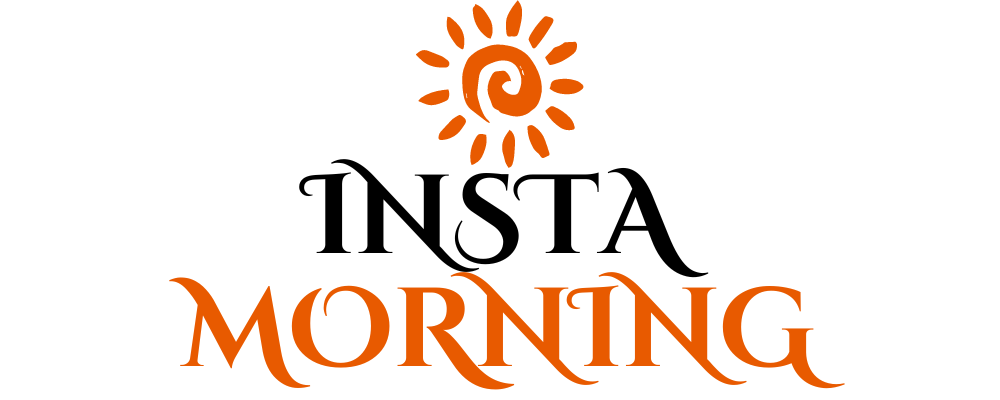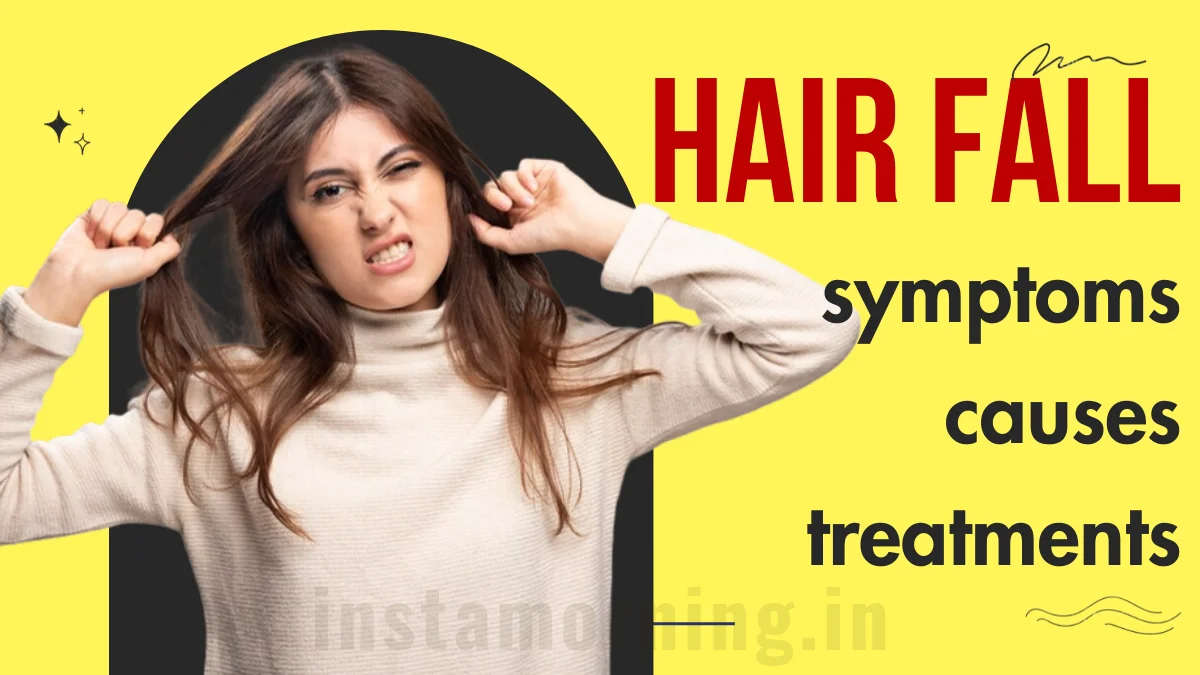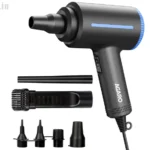Hair fall is a universal concern that doesn’t discriminate – it can happen to anyone. A silent epidemic that affects self-confidence and can strike without warning.
Table of Contents
What Is Hair Fall?
Hair fall is a distressing condition that can strike anyone, regardless of age, gender, or ethnicity. It is characterized by the excessive shedding of hair, leading to thinning, baldness, and a loss of confidence.
If you’re noticing hair loss, it’s necessary to act swiftly to identify the causes of hair fall and seek treatment. Hair fall can be a symptom of a variety of underlying medical conditions, such as thyroid problems, anaemia, or hormonal imbalances. It can also be caused by stress, nutritional deficiencies, or certain medications.
The longer you wait to address hair fall, the more difficult it may be to reverse the damage.
Therefore, it is crucial to take immediate action to stop hair fall if you notice excessive hair shedding.
Symptoms Of Hair Fall
Knowing the specific patterns and symptoms of different hair loss types is critical for effective management. Identifying the underlying cause of your hair loss is crucial for determining the most appropriate treatment or management plan.
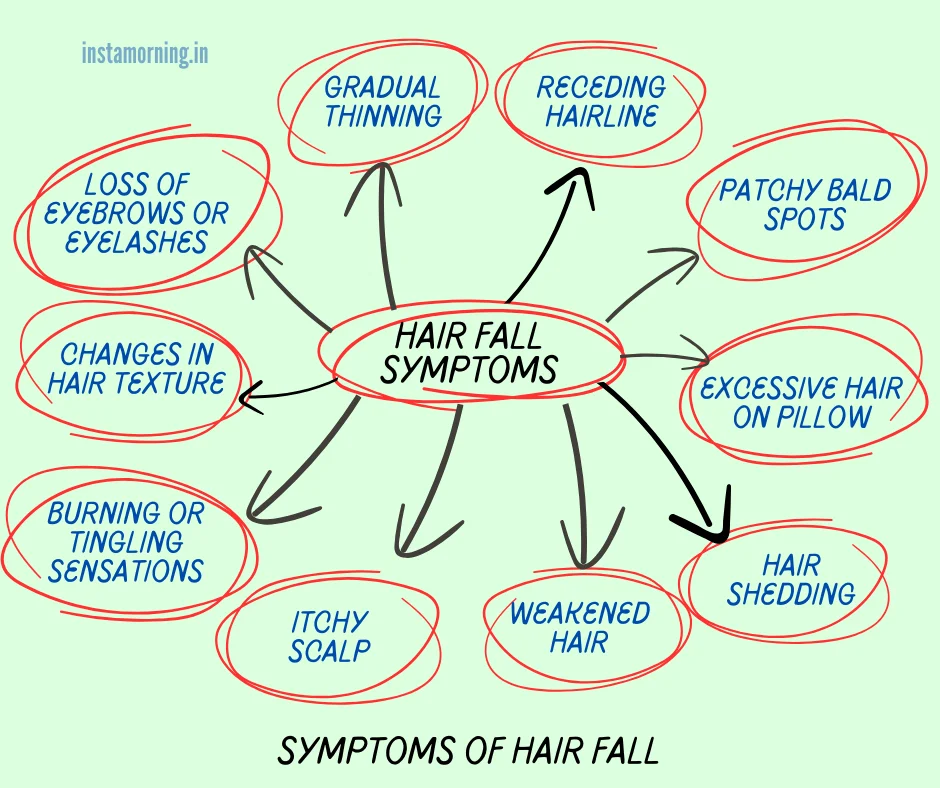
Consulting with a healthcare professional or dermatologist is the best way to diagnose the cause and discuss suitable treatments or interventions. Let’s delve into more detail about each of the symptoms of hair fall:
Gradual Thinning
Gradual thinning of the hair is often one of the first signs of hair loss. It may not be immediately noticeable, but over time, you might observe that your hair appears less dense and thinner.
This type of hair loss is often associated with androgenetic alopecia, which is a hereditary condition affecting both men and women. In men, it’s commonly referred to as male pattern baldness, while in women, it’s known as female pattern baldness.
Receding Hairline
In men, a receding hairline is a typical symptom of male pattern baldness. It usually begins with a receding of the hairline at the temples and then progresses backwards. This pattern can result in a distinct “M” shape formed by the hairline as it recedes.
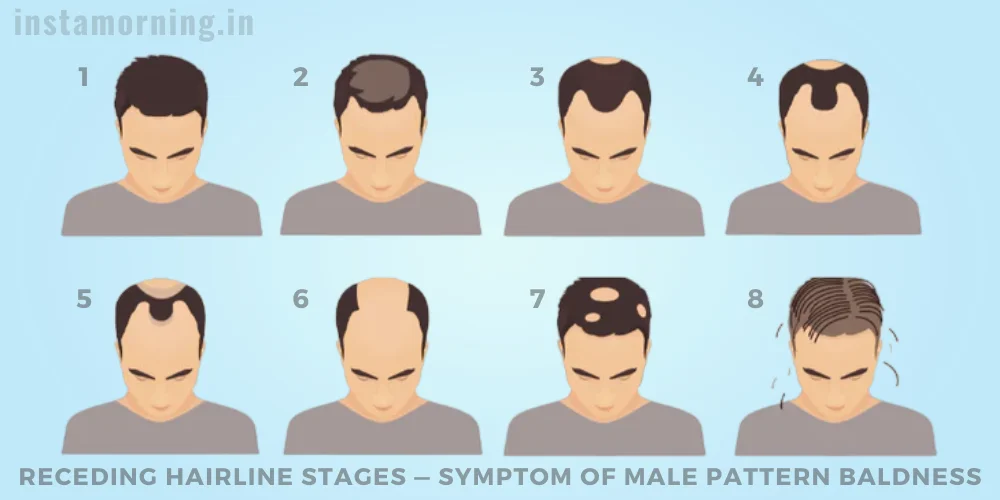
Circular or Patchy Bald Spots
Bald spots can occur when hair loss is more localized. These spots can be round or irregular in shape and may appear suddenly or gradually over time.
Circular or Patchy Bald Spots can be caused by various conditions, including alopecia areata, a condition where the immune system attacks hair follicles.
Excessive Hair on Pillow or Clothing
Finding an unusually high amount of hair on your pillow, in your hairbrush, or on your clothing is often an early indicator of hair loss.

The shedding of hair may be particularly noticeable during activities like brushing, showering, or sleeping.
Hair Shedding
Hair shedding refers to the increased release of hair when combing, brushing, or washing your hair.

It’s common for people to lose some hair each day as part of the natural hair growth cycle. However, excessive shedding can be a sign of a problem, such as telogen effluvium, which can be triggered by stress, illness, or changes in hormones.
Weakened Hair
Weakened hair can become more prone to breakage. This can make your hair feel brittle and look less healthy.
Weakened hair can result from a variety of factors, including poor nutrition, excessive heat styling, and chemical treatments.
Itchy Scalp
An itchy or irritated scalp can be associated with certain scalp conditions, such as dandruff, psoriasis, or seborrheic dermatitis.
Persistent itching and irritation may lead to hair loss if the underlying condition is not properly managed.
Burning or Tingling Sensations
Some individuals experiencing hair loss may report sensations of burning or tingling on the scalp.
Scalp burning sensation can be linked to certain hair loss conditions, such as alopecia areata, and may occur before hair loss becomes noticeable.
Changes in Hair Texture
Hair loss can lead to changes in the texture of the remaining hair. The hair may become finer and softer. This change in texture can be most noticeable in areas where hair loss is occurring.
Loss of Eyebrows or Eyelashes
Hair loss isn’t limited to the scalp; it can affect other areas as well, including the eyebrows and eyelashes. Conditions like alopecia areata can result in the loss of eyebrow and eyelash hair.
What Causes Hair Loss?
Understanding why hair loss occurs is essential, as it can result from a combination of factors, including genetics, hormonal changes, autoimmune conditions, and even lifestyle choices.

Let us discuss some of the common causes which affect people of all ages and backgrounds:
Hair Fall Due To Stress
Stress can lead to hair fall because it disrupts the normal hair growth cycle. Stress can push more hair follicles into the resting phase (telogen), resulting in increased hair shedding.
Chronic stress can also lead to hormonal imbalances, which may contribute to hair loss.
Managing stress through relaxation techniques, exercise, and a healthy lifestyle can help reduce its impact on hair fall.
Hair Fall Due To Eating Habits
Poor eating habits, such as a diet lacking in essential nutrients, can have a direct impact on the health of your hair.
Consuming foods high in mercury, such as certain types of fish like sushi, mackerel, swordfish, and tuna, is associated with hair loss and should be avoided due to their high mercury content. Opt for lower-mercury options like shrimp, salmon, and light tuna.
Consuming foods rich in processed sugar can lead to elevated blood glucose levels, resulting in increased insulin production and higher androgen levels, which, in turn, can lead to hair follicle shrinkage and early baldness.
High-glycemic foods, such as pasta, starchy white bread, and pancakes, can readily convert to sugar in the body. This can have adverse effects on hair health as it leads to increased sugar consumption.
A diet lacking in calcium can negatively impact hair and nails. To ensure sufficient calcium intake, incorporating foods such as milk, cheese, and other dairy products is beneficial.
Insufficient intake of zinc and iron, both vital for hair health, can be addressed by including seafood, red meat, or beans in your diet to boost these essential nutrients.
Hair Fall Due To Protein Deficiency
Hair is primarily made up of a protein called keratin. Insufficient protein intake can lead to weakened hair structure and hair loss.
A lack of protein can push hair follicles into the resting phase, leading to increased shedding and hair thinning.
Ensuring an adequate intake of proteins from sources like lean meats, fish, eggs, and plant-based options like beans and nuts is crucial for maintaining healthy hair.
Hair Fall Due To Vitamin Deficiency
Hair loss due to vitamin deficiency is a common concern, but it can be managed through proper nutrition and consultation with a healthcare expert.
Various vitamins play a role in hair health. For instance, vitamin D, B (particularly biotin and pantothenic acid), and vitamin A are essential for hair growth.
A deficiency in these vitamins can lead to hair thinning and even hair loss in severe cases.
Ensuring a balanced diet that includes a variety of foods rich in these vitamins or taking supplements as recommended by a healthcare professional can help address this issue.
Hair Fall Due To Dandruff
Many people are unaware that dandruff causes hair fall, which can lead to thinning hair over time.
Dandruff is a common scalp condition characterised by the shedding of dead skin cells from the scalp. It often leads to the appearance of white or flaky skin on the scalp and can be accompanied by itching.
Dandruff can indirectly contribute to hair fall. When the scalp is affected by dandruff, it can become itchy and inflamed. Excessive scratching can damage hair follicles, making them weaker and more prone to hair fall.
Additionally, severe dandruff may lead to a condition known as seborrheic dermatitis, which can exacerbate hair loss.
Hair Fall Due To Hard Water
To maintain healthy hair, you must take steps to protect hair from hard water.
Hard water contains a high mineral content, primarily calcium and magnesium. When you use hard water for washing your hair, it can lead to certain issues.
The minerals in hard water can build up on the scalp and hair over time, forming a layer that makes it difficult for shampoos and conditioners to work effectively. This can result in dry and brittle hair that is more susceptible to breakage and hair fall.
The minerals in hard water can also interact with hair products, potentially leading to dull, lifeless hair.
Hair Fall Due To Weight Loss
Hair fall due to weight loss is often caused by rapid and significant weight reduction. This can lead to a condition called “telogen effluvium,” in which a large number of hair follicles enter a resting phase, causing increased hair shedding.
Nutritional deficiencies and hormonal changes associated with extreme weight loss can also weaken hair follicles and contribute to hair loss.
Gradual, well-balanced weight loss and a nutrient-rich diet can help prevent this type of hair fall. Hair often regrows once the underlying cause is addressed.
Hair Fall Due To Chemical-Laden and Inappropriate Hair Care Products
The use of chemical-laden and inappropriate hair care products, such as shampoos, conditioners, hair dyes, or styling products, can harm the hair and scalp.
These products often contain harsh chemicals, sulfates, and other irritants that can strip away natural oils, damage hair follicles, and weaken the hair shaft.
Repeated or prolonged exposure to these products can lead to hair loss, hair thinning, and scalp conditions, such as dermatitis, that contribute to hair fall.
Using gentle, sulfate-free, and suitable hair care products can help maintain hair and scalp health, reducing the risk of hair fall due to chemical damage.
Hair Fall Due To Trichotillomania (Hair Pulling Disorder)
Trichotillomania is a psychological disorder characterized by the compulsive urge to pull out one’s hair, typically from the scalp, eyebrows, or eyelashes. This repetitive hair pulling can cause hair breakage and bald patches.
Hair fall resulting from trichotillomania is self-inflicted and often linked to emotional distress or anxiety. People with trichotillomania disorder may not even be aware of their behaviour.
Treating Hair Pulling Disorder usually requires psychological counselling or therapy to address the underlying causes and break the habit of hair-pulling. Hair regrowth can occur once the behaviour is controlled and the hair follicles are not permanently damaged.
Trichotillomania treatment typically involves cognitive-behavioural therapy to address the compulsive hair-pulling behaviour.
Hair Fall Due To Hormonal Imbalances
Hormonal imbalances can have a significant impact on hair health. Hormones, such as androgens (e.g., testosterone and dihydrotestosterone), play a role in regulating the hair growth cycle.
An imbalance in these hormones can lead to hair follicles becoming more sensitive to the hormone dihydrotestosterone (DHT), which can cause hair to become thinner and shorter over time.
Conditions such as polycystic ovary syndrome (PCOS), thyroid disorders, and menopause can lead to hormonal imbalances and contribute to hair loss.
Treating hair loss due to hormonal imbalances often involves addressing the underlying hormonal condition with medication, lifestyle changes, or hormone therapy.
Hair Fall Due To Environmental Factors
Hair fall due to environmental factors occurs when external elements in the environment contribute to increased hair loss.
These factors may include exposure to pollutants, UV radiation from the sun, hard water, extreme weather conditions, toxins in hair care products, and poor air quality.
These environmental elements can weaken hair follicles, disrupt hair growth, and lead to hair shedding. Protecting your hair from these factors and maintaining a healthy lifestyle can help minimize the impact of environmental hair fall.
Hair Fall Due To Smoking
Addictive lifestyle choices, such as smoking, can lead to reduced blood circulation. This reduction deprives hair follicles of essential nutrients and oxygen, weakening them and increasing their susceptibility to hair fall.
Smoking also introduces harmful chemicals and toxins into the body, negatively impacting the health of hair follicles. Elevated androgen levels and premature ageing associated with smoking can further contribute to hair loss.
Making informed and positive lifestyle choices is crucial for maintaining overall health and well-being, and the most effective way to address hair fall due to smoking is to quit smoking, allowing the body to recover and potentially improve the health of the hair and reduce hair loss over time. Quitting smoking is often a vital step in improving one’s lifestyle.
It’s essential to recognize the signs of addictive lifestyle choices and seek support or treatment when necessary to overcome these behaviours and improve one’s overall well-being.
Genetic Hair Loss
Genetic hair loss, also known as androgenetic alopecia, is one of the most common causes of hair fall. It’s hereditary and can affect both men and women.
This type of hair loss is linked to genetics and hormonal factors, particularly the influence of androgens, and it typically follows a specific pattern.
In men, it often leads to a receding hairline and balding at the crown, while in women, it can result in overall thinning of the hair.
Treatments for genetic hair loss may include medications like minoxidil or finasteride, low-level laser therapy, or hair transplant procedures.
Hair Fall Reasons in Women
Hair fall in women can be caused by a variety of factors. It’s important to understand that while these factors can contribute to hair fall in women, they are often not the sole cause.
Women may experience multiple factors simultaneously, and genetic predisposition can play a significant role in hair loss. Some of the most common reasons for hair fall in women include:
Birth Control
Some forms of hormonal birth control, such as oral contraceptives, can influence hormone levels in women. Changes in hormones may affect the hair growth cycle, leading to temporary hair loss, especially during the initial months of using or discontinuing birth control. The hair typically regrows once the body adjusts to the hormonal changes.
Pregnancy
During pregnancy, many women experience thicker, healthier hair due to hormonal changes. However, after childbirth, a significant number of women face postpartum hair shedding. This temporary hair loss is a result of hormone levels returning to normal, and it can last for a few months. It usually resolves on its own.
PCOS and PCOD (Polycystic Ovary Syndrome and Disorder)
PCOS and PCOD are hormonal disorders that can lead to higher levels of androgens in the body. Elevated androgens may cause hair thinning and hair loss in a male-pattern baldness pattern, which is more common in women with these conditions. Managing hormonal imbalances through medication or lifestyle changes can help improve hair health.
Hair Fall Due To Thyroid
Thyroid disorders, both hyperthyroidism and hypothyroidism, can disrupt the normal hair growth cycle. In hyperthyroidism, hair may become thin and fine, while in hypothyroidism, hair can become dry, coarse, and brittle. Treating the underlying thyroid condition can help address hair loss.
Menopause
Menopause is a natural phase in a woman’s life characterized by a decline in estrogen levels. This hormonal shift can lead to changes in the hair, including thinning and reduced hair volume. The use of hormone replacement therapy or specific hair care products can help mitigate the effects of menopausal hair loss.
Hair Fall Reasons in Men
Hair fall is a common concern among men, and there are a variety of reasons why it can occur. Some of the most common reasons for hair fall in men include:
DHT (Dihydrotestosterone)
DHT, or dihydrotestosterone, is a hormone derived from testosterone and plays a pivotal role in male pattern baldness (androgenetic alopecia).
DHT can negatively affect hair follicles in individuals who are genetically predisposed to this type of hair loss. It binds to receptors in the hair follicles, causing them to shrink over time, a process known as miniaturization.
This shrinking of the hair follicles results in the production of finer and shorter hair strands. Over time, the affected follicles may stop producing visible hair altogether.
Understanding and managing DHT is critical in addressing male pattern baldness. Various treatments, including medications like finasteride, target DHT to slow down its effects on hair follicles and minimize hair loss.
Male Pattern Baldness
Male pattern baldness, also known as androgenetic alopecia, is the most prevalent cause of hair loss in men. It is primarily hereditary and linked to genetics.
It results from the effects of dihydrotestosterone (DHT), a hormone derived from testosterone, on hair follicles. DHT can cause hair follicles to shrink over time, leading to gradual hair thinning, receding hairlines, and balding.
Male pattern baldness follows a predictable pattern and is characterized by the horseshoe-shaped balding at the crown and receding hairline.
Telogen Effluvium
Telogen effluvium is a temporary condition that occurs when a significant stressor, such as illness, surgery, emotional stress, or extreme weight loss, pushes a large number of hair follicles into the resting (telogen) phase of the hair growth cycle.
This leads to increased hair shedding several months after the stressful event, often affecting the entire scalp. Fortunately, the hair typically regrows once the underlying cause is addressed.
Nutritional Deficiency
Nutritional deficiencies, particularly a lack of essential nutrients like proteins, vitamins (e.g., biotin, iron), and minerals (e.g., zinc), can negatively impact hair health and lead to hair fall.
A balanced diet with adequate nutrients is crucial for healthy hair growth. Deficiencies can be addressed through dietary improvements or supplements.
Underlying Medical Concerns
Various underlying medical conditions can contribute to hair fall in men. These may include thyroid disorders (hyperthyroidism or hypothyroidism), autoimmune diseases (alopecia areata), or conditions that disrupt the hair growth cycle.
Managing and treating the underlying medical issue can often help address associated hair loss.
Hair Fall Treatments
If you are experiencing hair fall, there are a number of treatments available to help slow or stop the process and promote hair growth. These treatments can be medical, surgical, or natural. You can try some of the treatments discussed below:
Topical Treatments
Topical Treatments are a category of hair fall treatments that involve the application of products directly to the scalp and hair. These treatments come in various forms, including shampoos, serums, and topical solutions.
Their primary purpose is to improve hair health, reduce excessive hair shedding, and stimulate hair growth. Key Ingredients commonly found in these topical treatments include:
Biotin: Also known as vitamin B7 or vitamin H, Biotin is a water-soluble B vitamin that is essential for energy production, fatty acid synthesis, and amino acid metabolism. It is also important for the health of hair, skin, and nails.
Ketoconazole: Ketoconazole is an antifungal medication sometimes used in hair loss products. It can help reduce inflammation on the scalp, which can be associated with hair loss.
Caffeine: Caffeine is thought to stimulate hair follicles and promote hair growth. It can also help block the effects of dihydrotestosterone (DHT), a hormone linked to male pattern baldness.
Saw Palmetto: An herbal extract that may inhibit the action of DHT, making it useful for addressing hair loss, especially in men.
Minoxidil: While minoxidil is often associated with topical treatments, it’s worth noting that it is a medication approved by the FDA for promoting hair growth and is available in both liquid and foam formulations.
Niacin (Vitamin B3): Niacin may improve blood circulation to the scalp, which can benefit hair health.
Here’s an explanation of topical treatments for hair fall:
Shampoos
Shampoos are fundamental for hair care. They cleanse the scalp and hair by removing dirt, excess oils, and product buildup. They also help maintain the cleanliness and freshness of the hair.
Some shampoos are formulated to address specific hair fall concerns. They may contain ingredients that support hair growth, strengthen hair follicles, or reduce breakage. These shampoos are often used as part of a comprehensive approach to managing hair fall.
If you’re struggling with hair fall, using a hair fall control shampoo can be a key step towards regaining healthy and strong hair.
Conditioners
Conditioners are essential for maintaining well-hydrated and manageable hair. They provide moisture, reduce frizz, and make the hair easier to comb and style. Conditioning treatments can improve the overall texture and appearance of the hair.
While conditioners primarily focus on hair health and appearance, using a conditioner can help prevent hair breakage and reduce stress on the hair, which can indirectly contribute to less hair fall.
Oils
Hair oils, such as coconut, argan, or jojoba oil, are used to nourish and moisturize the hair. They can add shine and softness while protecting the hair from damage caused by heat styling and environmental factors.
Certain oils, like castor oil or rosemary oil, are believed to promote hair growth and reduce hair fall. These oils can be massaged into the scalp to improve circulation and strengthen hair follicles.
Serums
Hair serums are leave-in products that target specific concerns. They add shine, reduce frizz, and protect the hair from damage due to styling or environmental factors. They can enhance the appearance and manageability of the hair.
Some hair serums are formulated to support hair growth and reduce hair fall. They may contain ingredients that strengthen the hair and improve its resilience against breakage.
Hair Gummies
Hair gummies are dietary supplements that contain vitamins and minerals important for overall hair health. They can help ensure that the body has the necessary nutrients for hair growth.
While not a direct treatment for hair fall, hair gummies can promote healthier hair by providing essential nutrients like biotin, vitamins, and minerals, which can indirectly contribute to reduced hair fall.
Medical Procedures
Medical procedures are typically recommended for more advanced or severe hair loss. Common procedures include:
Hair Transplantation
This surgical procedure involves transplanting hair follicles from one part of the body (typically the back of the scalp) to areas with thinning or no hair.
Scalp Reduction
A surgical procedure where a portion of the bald scalp is removed and the remaining areas are stretched and sutured together to reduce the bald area.
Low-Level Laser Therapy (LLLT)
Non-invasive treatment using low-level lasers or light-emitting diodes to stimulate hair follicles and promote growth.
Platelet-Rich Plasma (PRP) Therapy
This involves drawing the patient’s blood, processing it to concentrate platelets, and then injecting the platelet-rich plasma into the scalp to stimulate hair follicles.
Lifestyle and Dietary Changes
Proper nutrition and a healthy lifestyle play a crucial role in maintaining healthy hair. A balanced diet rich in essential nutrients, regular exercise, and stress management can contribute to overall hair health.
Cosmetic Solutions
Hair concealers, wigs, hairpieces, and styling techniques can be used to conceal hair loss and improve the appearance of thinning hair.
Natural Remedies
Some people explore natural remedies for hair fall control, such as herbal supplements, essential oils, and scalp massages, as complementary treatments for hair fall.
How To Prevent Hair Fall
There are a number of things you can do to help prevent hair fall. Here are some tips on how to prevent hair fall:
Regular Hair Wash
Using a shampoo and washing your hair too frequently can strip it of its natural oils, making it dry and more prone to breakage. It’s important to strike a balance between keeping your scalp clean and maintaining essential moisture.
To prevent hair fall, aim for a regular but not excessive washing routine. How often you should wash your hair can depend on your hair type and lifestyle. Generally, it’s recommended to shampoo wash every 2-3 days for most hair types.
Use A Conditioner
When you shampoo your hair, the cuticles (the outermost layer of your hair) can become raised or open. This makes your hair more prone to damage and breakage. Conditioner helps to close these cuticles, making your hair smoother and less vulnerable to damage.
Conditioners are essential for maintaining well-hydrated and manageable hair. They help protect the hair from breakage, which, in turn, can help prevent hair fall, reduce frizz, and make it easier to comb and style.
Avoid Chemicals
Harsh chemicals found in some hair care products, like sulfates and parabens, can damage hair and weaken the hair shaft. Opt for natural or sulfate-free shampoos and conditioners that are gentler on your hair.
Reducing chemical exposure also extends to avoiding excessive heat styling and treatments like perms or relaxers, which can stress the hair.
Protein Diet Food
Hair is primarily made of a protein called keratin. Consuming a high protein diet is essential for maintaining healthy hair. Protein helps in repairing and strengthening hair strands, making them less likely to break.
Foods like lean meats, fish, eggs, dairy products, legumes, and nuts are excellent sources of protein for healthy hair.
Quit Smoking
Smoking has been linked to various health issues, including hair loss. The harmful chemicals in tobacco smoke can restrict blood flow to the hair follicles and damage hair structure, leading to increased hair fall.
Quitting smoke can improve overall health and have a positive impact on hair health as well.
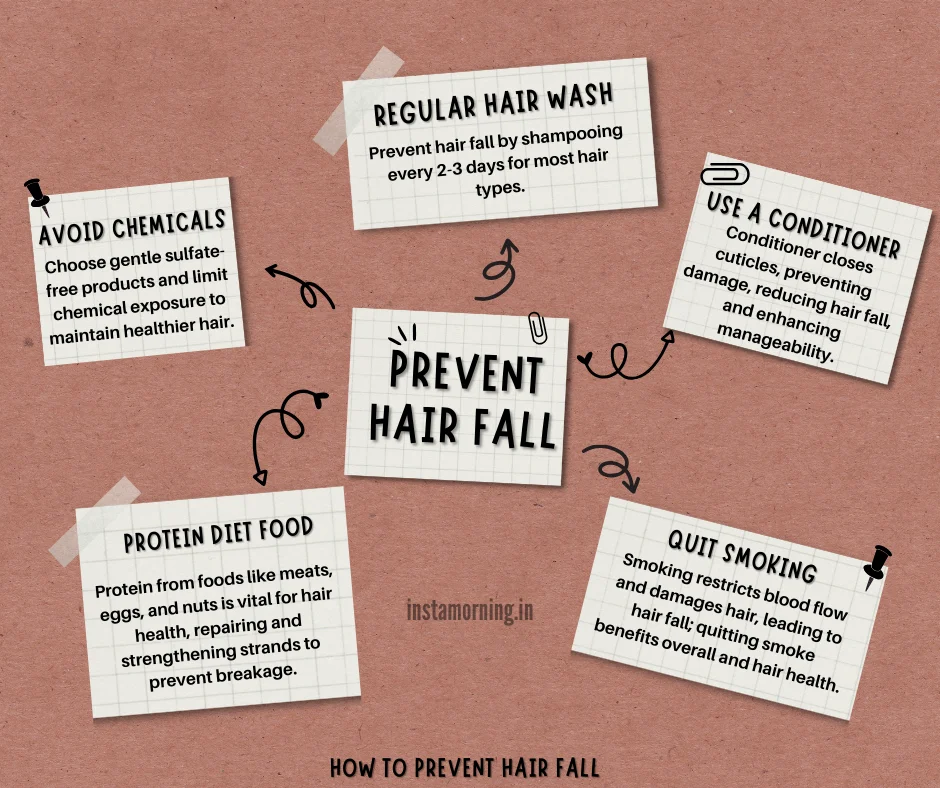
Final Words
In the pursuit of healthier, more resilient hair, your proactive steps can make all the difference. The information provided in this article equips you with the tools to safeguard your hair.
Whether it’s managing stress, maintaining a balanced diet rich in essential nutrients, avoiding harmful chemicals, or making lifestyle changes, the power to protect your hair is in your hands.
Don’t let hair fall undermine your confidence and well-being. Act now, follow the tips and guidelines, and watch your hair flourish. Every strand counts, and your hair deserves the very best care.
Remember, every strand counts, and your hair deserves the very best care.
